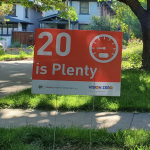Delegate vote: Add INC’s support to “20 Is Plenty”
Movement to Change Default Speed Limit When No Speed Is Posted
The INC Board of Directors recommends approval of this motion, which was considered at the September Executive Committee meeting and was recommended at the August Transportation Committee meeting with a vote of 25-1:
Moved: INC should officially support “20 Is Plenty” effort, asking the City to change the default speed limit on streets where no speed limit signs are posted, which are typically local neighborhood streets, from 25 mph to 20 mph.
Background:
- Speeding through neighborhoods — particularly the local neighborhood streets where no speed limit signs are posted and the “default” speed limit applies — has been a consistent complaint heard around the city and reported to the INC Transportation Committee.
- This change sets the legal framework for DOTI to engineer these streets to encourage calmer speeds, knowing that Council has set the target design speed to 20 mph where not otherwise posted.
- Council has the authority to make this change to the law, where the default unposted speed limit on streets is 25 mph, in the Denver Revised Municipal Code, section 54-157.
- This position is consistent with Delegation-adopted INC Transportation Platform, particularly items:
- 3.1 (Vision Zero),
- 3.4 (Reevaluate speed limits and lane widths based on street typology and best practices from other cities), and
- 3.5 (“Traffic speeds in residential neighborhoods should be lower than speeds on main arterials between neighborhoods”)
- Now is the time – the city is about to embark on translating the vision in the Complete Streets Design Guidelines into actual engineering standards.
Answers to questions:
- Is this a call for more police enforcement? No.
- We know the main determinant of drivers’ speeds is the design of the road, and the design of the road is determined by the target speed the engineers use.
- Is This A “Best Practice?” Yes!
- “Twenty is plenty” is a worldwide movement with hundreds of cities adopting 20 mph residential speed limits, including US cities like Boston, Boulder, Minneapolis, Portland, St. Paul and Seattle.
- Will this increase costs to DOTI? No.
- This change to the law will not cause increased DOTI costs — these are streets with no posted signs, so there are no signs to change. Changed street design standards will influence new streets and whenever streets are redesigned, but will not cause street changes directly.
- Does this change support Vision Zero? Yes!
- This is consistent with Denver’s Vision Zero Action Plan, which INC participated in through the Vision Zero Collective. Among other things, the plan says: “Research shows that 20 mph speed zones are effective in reducing pedestrians’ risk of injury or death, with the greatest benefits observed for children under age 15.”
For more information:
- Contact Joel Noble, Chair of the INC Transportation Committee at transportation@denverinc.org
- Denver Streets Partnership’s 20 Is Plenty page
- Order 20 Is Plenty yard signs (Free — donation requested)
![]()



Comments
Delegate vote: Add INC’s support to “20 Is Plenty” — No Comments
HTML tags allowed in your comment: <a href="" title=""> <abbr title=""> <acronym title=""> <b> <blockquote cite=""> <cite> <code> <del datetime=""> <em> <i> <q cite=""> <s> <strike> <strong>